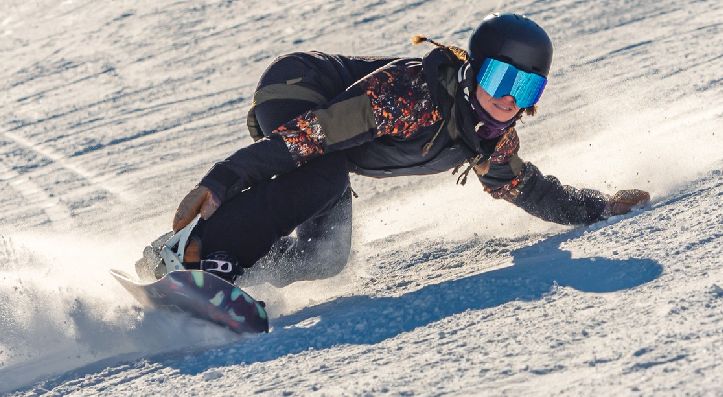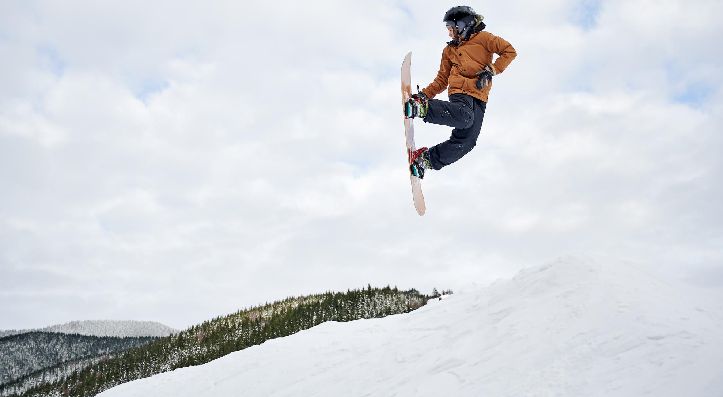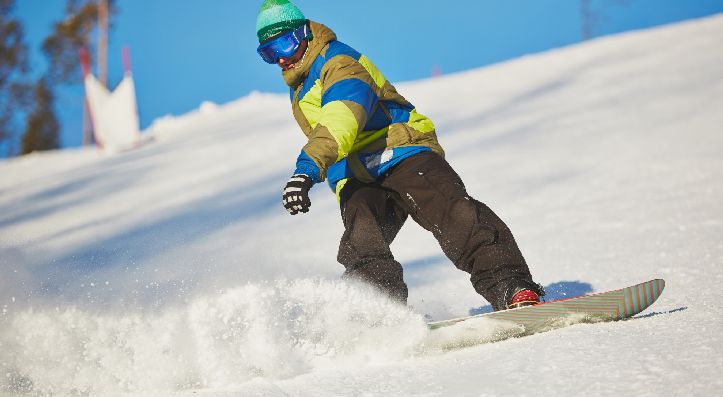Are you passionate about snowboarding? Do you dream of riding down slopes with style and precision, captivating audiences with skill and finesse? Becoming a professional snowboarder is a thrilling and challenging journey that requires dedication, perseverance, and a love for the sport. In this comprehensive guide, we will explore the steps and strategies to help you embark on the path of becoming a pro snowboarder.
Understanding the Basics
Snowboarding has come a long way since its inception, evolving into a popular winter sport with various disciplines. Before diving into professional snowboarding, you must familiarize yourself with the sport’s history, different styles, and techniques. By setting realistic goals and nurturing your passion for snowboarding, you lay the foundation for your journey ahead.
Developing Essential Skills
Mastering the fundamental skills of snowboarding is essential for any aspiring pro. It begins with honing your balance and body control on the board. Practicing proper stance, edge control, and carving techniques will enable you to ride confidently and precisely. Additionally, off-snow training, including exercises to build core strength and endurance, will enhance your performance on the slopes and reduce the risk of injury.
Learning from the Pros
Learning from successful professional snowboarders is an invaluable step in your journey. Researching and studying their careers, riding styles, and techniques will provide you with inspiration and insights. Actively participating in snowboarding events and competitions, starting with local contests, allows you to gain experience, network with fellow riders, and catch the attention of industry professionals.
Finding the Right Training Environment
Choosing the ideal snowboarding destination is crucial for your progress as a rider. Evaluating terrain, weather conditions, and facilities will help you find a location that suits your training needs. Enrolling in snowboarding camps and academies provides structured training programs and access to professional coaching, which can significantly accelerate your development. However, balancing formal training with independent practice is equally important to foster your unique style and creativity.
Building a Support Network
Building a solid support network is essential for your growth as a pro snowboarder. Seeking sponsorship and financial support from relevant brands requires creating an impressive snowboarding portfolio highlighting your achievements and potential. Additionally, collaborating with experienced coaches and mentors will provide you with guidance, constructive feedback, and invaluable industry connections.
Maintaining Physical and Mental Well-being
Physical fitness and mental resilience are vital components of becoming a pro snowboarder. Developing a regular training and conditioning routine that includes strength, endurance, and flexibility exercises will enhance your performance and prevent injuries. Prioritizing your mental health, learning to handle pressure, and overcoming setbacks will allow you to stay focused, motivated, and perform at your best.
Building a Competitive Profile
In the highly competitive world of professional snowboarding, building a compelling profile showcasing your skills and achievements is crucial. Creating a professional snowboarding resume with competition results, accolades, and video footage will help you stand out. Leveraging social media platforms and collaborating with brands can also provide exposure and open doors to potential sponsorships and professional opportunities.
Pursuing Sponsorships and Professional Opportunities
Securing sponsorships is a significant milestone in becoming a pro snowboarder. Researching brands and their sponsorship criteria will help you identify the right opportunities. Crafting compelling sponsorship proposals and applications backed by your impressive profile will increase your chances of securing sponsorships. Additionally, exploring avenues such as sports agencies and industry connections can help you discover potential career paths and professional opportunities in snowboarding.
Embracing a Pro Snowboarder Lifestyle
Becoming a professional snowboarder is not just about riding down slopes—it’s a lifestyle. As you progress in your journey, you’ll need to understand and embrace the responsibilities and commitments of being a pro. Balancing your training, competitions, and personal life becomes crucial. Traveling to different snowboarding destinations and adapting to varying environments will broaden your skills and experiences as a rider.
Continuously pushing your boundaries and evolving as a rider is another vital aspect of the pro snowboarder lifestyle. Embrace new tricks, techniques, and challenges that come your way. Explore different snowboarding disciplines, such as freestyle, freeride, or backcountry, to diversify your skill set and showcase your versatility as a rider.
Conclusion
Becoming a professional snowboarder is an exhilarating journey filled with challenges, growth, and countless memorable moments on the slopes. By understanding the basics, developing essential skills, learning from the pros, and finding the right training environment, you pave the way for your success. Building a support network, maintaining physical and mental well-being, and crafting a competitive profile is crucial. Finally, pursuing sponsorships and embracing the pro snowboarder lifestyle can turn your passion for snowboarding into a fulfilling career. So, grab your board, conquer the slopes, and chase your dreams of becoming a pro snowboarder!
Remember, the journey may be challenging, but with perseverance, dedication, and a love for the sport, you can carve to the top of the snowboarding world.
Building a Strong Snowboarding Foundation: Mastering the Basics
Before you can become a pro snowboarder, it’s crucial to build a strong foundation by mastering the basics of the sport. This section will delve into the key elements that form the bedrock of your snowboarding skills.
First and foremost, understanding proper stance and body positioning is essential. Your stance refers to how your feet are positioned on the snowboard. Experiment with different stances, such as regular (left foot forward) or goofy (right foot forward), to find the most comfortable. Proper body positioning involves distributing your weight evenly, bending your knees, and maintaining a relaxed and balanced posture. Practice riding in different stances and experiment with weight distribution to find the optimal position for control and stability.
Another critical aspect of snowboarding is mastering edge control. The edges of your snowboard are the metal edges that come in contact with the snow. Learning to control and utilize your advantages effectively is vital to carving turns, maintaining balance, and navigating various terrains. Start practicing on gentle slopes, gradually progressing to steeper terrain as your skills improve. Focus on shifting your weight and using your edges to initiate and control turns, allowing you to navigate the mountain with precision and control.
From Amateurs to Pros: Learning from Successful Snowboarders
Learning from those who have already achieved success in snowboarding can provide invaluable insights and inspiration for your journey. Take the time to research and study professional snowboarders who you admire and resonate with. Watch their videos, read about their careers, and analyze their riding styles and techniques.
By studying the pros, you can gain a deeper understanding of the sport and learn new tricks and maneuvers. Please pay attention to their body movements, how they navigate obstacles, and their overall riding style. Observe how they adapt to different terrains and conditions, and note any unique techniques they employ. Incorporate these learnings into your riding, adapting and refining them to develop your style.
Additionally, actively participating in snowboarding events and competitions is crucial to becoming a pro. Start with local and regional contests, as they provide a platform to showcase your skills and gain valuable experience. Competing against other talented riders pushes you to improve, hones your competitive edge, and exposes you to the snowboarding community. Networking with fellow riders, coaches, and industry professionals at these events can open doors to new opportunities and connections that can help propel your career forward.
The Importance of Choosing the Right Training Environment
Your chosen training environment plays a significant role in your growth and progress as a snowboarder. When selecting a destination for your training, consider terrain, weather conditions, and available facilities.
Look for resorts or mountains that offer a diverse range of terrain suited to your preferred snowboarding discipline. Whether you’re interested in freestyle, freeride, or backcountry riding, having access to suitable terrain can enhance your skills and provide ample progression opportunities. Consider the availability of terrain parks, halfpipes, or powder-filled slopes that align with your goals and aspirations.
Weather conditions also play a crucial role in your training. Seek out locations with consistent snowfall and favorable weather patterns. Resorts with a more extended snowboarding season or those with reliable snowmaking capabilities can provide vast training opportunities and ensure you have ample time on the slopes to refine your skills.
Furthermore, having access to quality training facilities and resources is essential. Look for resorts or training centers that offer dedicated snowboarding programs, coaching, and equipment rentals. These resources can provide structured training programs, expert guidance, and access to specialized training features such as progression parks, foam pits, or trampolines. These facilities can accelerate your learning curve and help you develop new tricks and techniques in a safe and controlled environment.
Nurturing Your Talent: Building a Support Network in Snowboarding
Building a solid support network is crucial for your growth as a snowboarder. Surrounding yourself with individuals who share your passion for the sport and believe in your potential can provide invaluable support and guidance along your journey.
A critical aspect of building your support network is seeking sponsorship and financial support from relevant brands. To attract potential sponsors, you must create an impressive snowboarding portfolio showcasing your achievements, skills, and potential. This includes compiling videos of your best runs and tricks, highlighting your competition results, and showcasing any media coverage or endorsements you may have received. Craft a compelling sponsorship proposal communicating your passion, dedication, and unique value as a rider. Research brands that align with your values and contact them with your submission, expressing your interest in a potential partnership.
In addition to seeking sponsorship, collaborating with experienced coaches and mentors can significantly benefit your progression as a snowboarder. A knowledgeable coach can provide expert guidance, help you identify areas for improvement, and design customized training programs tailored to your specific needs and goals. They can also provide valuable feedback on your technique and support you both on and off the slopes. Look for coaches with experience in your preferred snowboarding discipline and seek recommendations from fellow riders or industry professionals.
Networking within the snowboarding community is another effective way to build your support network. Attend industry events, join snowboarding clubs or organizations, and connect with fellow riders, coaches, and industry insiders. Engaging in conversations, sharing experiences, and seeking advice from more experienced individuals can open doors to new opportunities, foster mentorship relationships, and provide a sense of community as you navigate your path to becoming a pro snowboarder.
Achieving Peak Performance: The Role of Physical and Mental Well-being
To perform at your best as a snowboarder, it’s essential to prioritize both your physical fitness and mental well-being.
Physical fitness is a crucial component of snowboarding, requiring strength, endurance, and flexibility. Develop a regular training and conditioning routine with exercises specifically targeted to improve your snowboarding performance. Incorporate strength training exercises focusing on your lower, core, and upper body to enhance stability, power, and control. Engage in cardiovascular exercises such as running, cycling, or swimming to build endurance and improve overall fitness. Additionally, flexibility training through activities such as yoga or stretching helps prevent injuries and enhances your range of motion on the board.
Mental well-being is equally important in snowboarding. The pressures of competition, the constant drive to improve, and the potential for setbacks can take a toll on your mental state. Developing mental resilience and adopting strategies to manage stress and pressure is crucial. Incorporate mindfulness techniques, such as meditation or deep breathing exercises, into your routine to stay centered and focused. Visualize successful runs and positive outcomes to boost confidence and mental preparation. Additionally, maintaining a healthy work-life balance and nurturing supportive relationships outside of snowboarding can contribute to your overall well-being and happiness.
By prioritizing your physical and mental well-being, you’ll be better equipped to face the challenges and demands of professional snowboarding.
Crafting Your Competitive Profile: Standing Out in the Snowboarding Industry
In the highly competitive world of professional snowboarding, standing out and creating a compelling competitive profile is essential to catch the attention of sponsors, industry professionals, and fans. This section will guide you on how to craft a profile that sets you apart from the competition.
A professional snowboarding resume is a powerful tool to showcase your achievements and skills. Highlight your competition results, including podium finishes and notable performances. Include any accolades, awards, or recognitions you have received. Provide a comprehensive list of your snowboarding experiences, such as the events you have participated in and the disciplines you excel in. Emphasize any unique aspects of your riding style or innovative tricks you have mastered.
Video footage is an incredibly effective way to demonstrate your talent and style as a snowboarder. Compile a well-edited highlight reel showcasing your best runs, tricks, and freestyle maneuvers. Use multiple camera angles and include a variety of terrains and conditions to showcase your versatility. The video should capture your personality and passion for snowboarding, leaving a lasting impression on those who watch it.
Utilize social media and online platforms to your advantage. Create a solid online presence by regularly posting engaging content related to your snowboarding journey. Share photos and videos of your training sessions, competitions, and behind-the-scenes moments. Interact with your audience, respond to comments, and collaborate with other snowboarders or brands in the industry. Social media provides a platform for exposure and networking, allowing you to connect with potential sponsors and fans.
Collaborating with brands and showcasing their products can also enhance your competitive profile. Approach brands that align with your values and riding style. Develop mutually beneficial partnerships where you endorse and promote their products through social media posts, event appearances, or video content. This collaboration helps you gain visibility and establishes credibility and professionalism within the industry.
Continuously strive to innovate and push the boundaries of snowboarding. Experiment with new tricks, explore different terrains and participate in events or projects that challenge you. Embrace creativity and uniqueness in your riding style to stand out from the crowd. By consistently pushing yourself and seeking new experiences, you’ll demonstrate your commitment to growth and progression, catching the attention of industry professionals and setting yourself apart as a pro snowboarder.
Securing sponsorships is a significant milestone on your journey to becoming a pro snowboarder. Research brands in the snowboarding industry and align them with your values and riding style. Understand their sponsorship criteria and what they look for in athletes they support.
When approaching potential sponsors, craft a personalized sponsorship proposal highlighting your unique selling points. Clearly communicate your achievements, skills, and aspirations as a snowboarder. Explain how a partnership with the brand can benefit both parties, showcasing your ability to represent their products and values effectively. Include your competitive profile, video footage, and any media coverage you have received to reinforce your credibility.
Seeking representation from sports agencies can also open doors to professional opportunities. Sports agents have established connections within the industry and can help secure sponsorships, negotiate contracts, and guide your career path. Research reputable sports agencies specializing in snowboarding and reach out to them to explore representation possibilities.
It’s essential to stay proactive and seize any professional opportunities that come your way. Attend industry events, trade shows, and snowboarding festivals to network with industry professionals, sponsors, and fellow riders. Be open to collaborations, such as photo shoots, video projects, or team sponsorships, as they provide exposure and opportunities for growth.
FAQ: How to Become a Pro Snowboarder
Q: What age do I need to start snowboarding to become a pro?
A: There is no specific age requirement to start snowboarding. Many professional snowboarders begin young, but there is always time to start. With dedication, hard work, and proper training, you can pursue a career in snowboarding at any age.
Q: Do I need to compete in snowboarding events to become a pro?
A: While competing in snowboarding events can provide valuable experience and exposure, there are other paths to becoming a pro. Participating in events allows you to showcase your skills and network with industry professionals, but focusing on skill development, building a solid profile, and seeking sponsorships are equally important.
Q: How often should I train to become a pro snowboarder?
A: The training frequency depends on your goals, availability, and level of commitment. Consistent practice is crucial for skill development and progression. Aim for regular training sessions on and off the snow to improve your riding technique, strength, and endurance. However, it’s also important to listen to your body and allow for rest and recovery to prevent overexertion and injuries.
Q: How can I fund my snowboarding career?
A: Funding your snowboarding career can be challenging. Seek sponsorships from snowboarding brands that align with your values and style. Create an impressive portfolio, including competition results, videos, and media coverage, and approach potential sponsors with a well-crafted sponsorship proposal. Additionally, explore crowdfunding platforms, grants, and scholarships supporting aspiring snowboarding athletes.
Q: Can I become a pro snowboarder without moving to a snowboarding hotspot?
A: While living in a snowboarding hotspot can provide advantages regarding access to training facilities and opportunities, it is not the only way to become a pro. You can still pursue a snowboarding career by making the most of local slopes, participating in regional competitions, and attending training camps during the winter season. It may require more effort and dedication, but it is possible to succeed without relocating.
Q: How important is mental resilience in becoming a pro snowboarder?
A: Mental resilience is crucial in the world of professional snowboarding. The ability to handle pressure, overcome setbacks, and stay motivated is essential for success. Developing strategies to manage stress, such as mindfulness techniques, visualization, and maintaining a healthy work-life balance, will contribute to your overall well-being and performance on and off the slopes.
Q: Can I pursue a career in snowboarding while still attending school or working?
A: Balancing a career in snowboarding with other commitments, such as school or work, can be challenging but not impossible. It requires effective time management, dedication, and support from your education or workplace. Flexible schedules, online learning options, and understanding employers can make it feasible to pursue both your passion for snowboarding and other responsibilities.
Q: How long does it take to become a pro snowboarder?
A: The time it takes to become a pro snowboarder varies for each individual. It depends on your starting skill level, dedication, training opportunities, and natural talent. Becoming a pro snowboarder is a journey that requires continuous improvement, experience, and perseverance. Some individuals achieve pro status within a few years, while others may take longer. Focus on your personal growth and progression rather than comparing yourself to others.
Q: Can I transition from recreational snowboarding to becoming a pro?
A: Transitioning from recreational snowboarding to becoming a pro is possible with dedication, focused training, and a passion for the sport. Assess your skills, set goals, and commit to regular exercise and skill development. Seek opportunities to immerse yourself in the snowboarding community, participate in events, and showcase your talent. With the right mindset and determination, you can make the transition from recreational snowboarding to the professional level.
About The Author

Alison Sowle is the typical tv guru. With a social media evangelist background, she knows how to get her message out there. However, she's also an introvert at heart and loves nothing more than writing for hours on end. She's a passionate creator who takes great joy in learning about new cultures - especially when it comes to beer!



